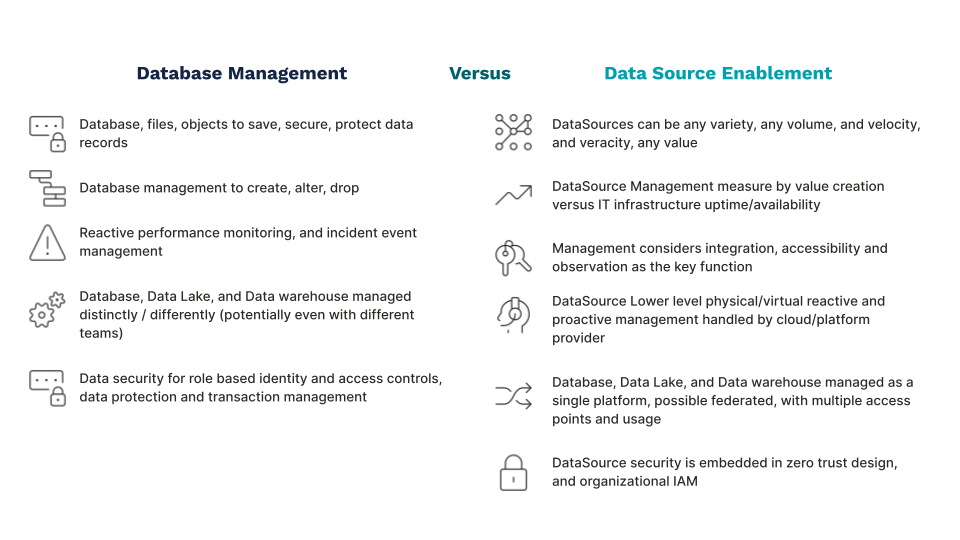The DBA’s Future Role in Driving Digital Transformation
The CTO's decision to drive digital transformation forward will impact the role of the DBA. The role of the DBA is changing to support the CTO in their mission and the business at large in monetizing data.
Digital transformation is no longer an option but an imperative for sustainable growth. While the CTO outlines the strategic narrative, DBAs serve as the force that activates data monetization—the fuel for transformation.
As data asset custodians, DBAs play a pivotal role in:
- democratizing data through governance to amplify its value
- ensuring security and resilience in the face of intensifying threats
- reorienting databases and data states for cloud-centric deployments
This evolution of the DBA will be vital for capitalizing on the numerous opportunities for monetizing data on a path toward continued business growth.
Going forward, the DBA is aligned with the adjusted role and mission of the CTO. They're now measured by and focused on monetizing data, embedding security into the business pipeline to ensure digital resilience, and shifting from database to data sources—building and integrating those data sources on the cloud.
Pivoting DBAs from database management to data source Enablers
The people who manage the business's data and what they do have changed in their day-to-day roles will change over time.
Businesses are moving from this labor arbitrage where they’ve added more DBAs to handle more of the database work as data grows—as unstructured data, semi-structured data, and machine data grow by orders of magnitude. They've had to look not to add people into the world but to create automation.
Through automation and AI, machine learning, and RPA infrastructure code, businesses have had to change the skills of the DBAs. In fact, the DBA generally moves from being mainly a database management administrator. You might call them a data source enabler.
That's the big change businesses must focus on regarding their operational teams and resources. It's not about a structured data source: rows, columns, and tables. It's now any source from any volume coming from any velocity to create business insight.

DBAs become cloud data managers
The smart cloud approach is that once I have it in the right place, you can consider native or agnostic implementation. Ask yourself: “Am I likely to move that data source around if I integrate it to various destinations, and therefore need to have it accessible from a networking perspective?” It’s essential to consider the automation involved in moving that data and making it accessible and available to various places.
The cloud is an amplifier and accelerator for digital transformation initiatives by providing the following.
- Access to leading-edge capabilities: Cloud providers invest heavily in R&D, enabling innovations in security, analytics, automation, etc.
- Increased agility and scalability: Infrastructure can be spun up and down on demand to accommodate spikes and shifts
- Enhanced resilience and availability: Multi-regional deployments with failover mechanisms minimize disruption
- Reduced TCO: No upfront capital expenditure and pay-per-use model lowers total cost of ownership
Hence, cloud adoption is no longer a question of if—but of where, when, and how. The operating model for DBAs must also evolve in the cloud paradigm. The DBA becomes the cloud data manager of that specific information. For instance:
- Databases transition from self-contained units to loosely coupled distributed data states spanning data warehouses, data lakes, etc.
- Focus expands from just database administration to holistic data state management—with tighter integration between transactional systems and analytical data
- Scale, security, and resilience require re-architecting deployments from scratch rather than simply migrating on-premise environments
DBAs become data automation developers
I often think of DBAs as data source enablers. However, I also see them taking on a new role as data automation developers. There has always been some development work for a DBA; they have written scripts to manage the database's health and created scripts to implement changes within the database through the development and QA in production environments.
Now, it's about creating more programming expertise. It's those same scripts that will become your intellectual property. The data automation developer will implement, change, and use the IP for organizational effectiveness and access to toolsets. They will create infrastructure code to move data, databases, data products, and applications through development, quality assurance, and production.
The skillset business will be hiring for will be looking for Python development experience and Terraform development experience. Those who have full platform engineering skill sets within the database team will be the ones who step into these roles.
DBAs become insight platform managers
DBAs would also consider themselves insight platform managers. They know it's not just about databases but also data sources. Databases might also be a data warehouse in a data lake or a lake house—a combination of a data warehouse and a lake. Consider what technology is being deployed and what cloud is being deployed on what third-party services will be used to manage the data—and have that data accessible externally.
You are considering a platform for insights, not just the data, for online transaction processing (OLTP) purposes.
DBAs become data security stewards
As DBAs shift to data source enablers, they need to harness the skills of data security stewards. It's not just the data backup and protection type or role-based access security. There is so much more that the DBA needs to focus on when it comes to security:
- Network security of your data source
- Global authentication authorization
- Encryption from the application down to the storage device
- Masking that data for privacy and privacy act concerns or consumer protection concerns
Your business must embed digital resilience, not just data backup and protection. DBAs need to think beyond and consider what happens when a customer requests data erasure or when there are illegal protections on this data. These all need to be their concerns as the new data source enabler.
The DBA is now the data source enabler
When it comes to emerging technologies and critical transformational strategy, the CTO charts the overall roadmap. This entails a cultural shift—the intellectual property of the database schema can no longer reside solely with DBA teams. Data must be democratized across the organizational fabric so business teams can harness insights to inform decisions.
The evolution of the role of DBAs and their pivot toward data enablement play an instrumental role in driving forward data monetization by:
- Ensuring widespread accessibility of data through governance frameworks
- Building literacy around data through the evangelization of its value
- Enforcing quality standards like accuracy, completeness, and timeliness
- Institutionalizing data governance policies and access protocols
DBAs thus have a key role in curating trustworthy, accessible data assets, building a data-driven culture, and providing the technical foundations for monetizing data—the core goal of the digital transformation program the CTO and CIOs are focused on driving forward.
Get your data to where it needs to be.We are here to support, manage, modernize, and transform your data –no matter where it lives. Pythian’s global teams of Consultants specialize in over 45 Database, Data Warehouse, and Cloud Technologies. |
Share this
Share this
More resources
Learn more about Pythian by reading the following blogs and articles.

A Growing Crisis of Value Measurement

Pythian: A Leading Datavail Competitor in Remote DBA and Managed Services
DBAs: The 5 key skills you will need in the cloud
Ready to unlock value from your data?
With Pythian, you can accomplish your data transformation goals and more.
